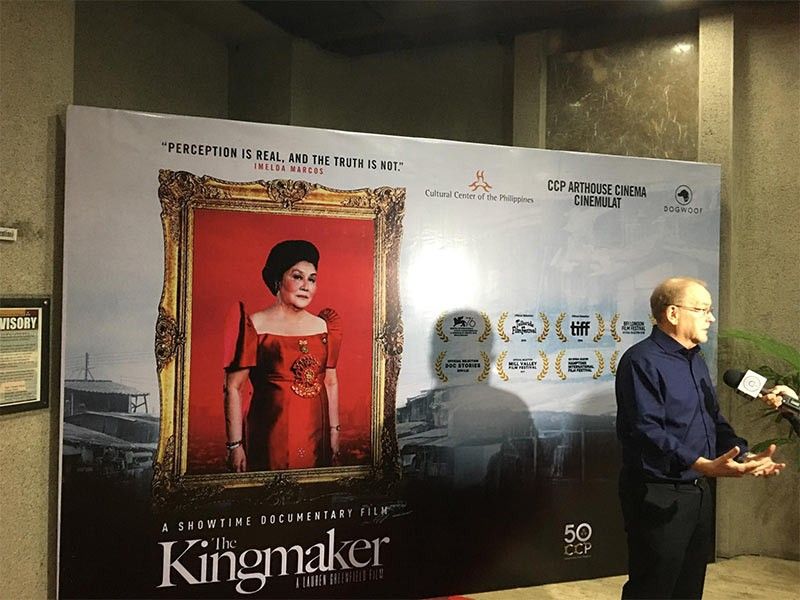Review: Lessons from Imelda Marcos biopic 'The Kingmaker'

MANILA, Philippines — If man is a political animal, then the woman is a titan.
A palpable tension hung in the air after the screening of anti-Marcos documentary "The Kingmaker" at the Cultural Center of the Philippines, a venue ironically once patroned by the very subject of the night’s feature film.
Directed by Emmy Award–winning filmmaker/photographer Lauren Greenfield, "The Kingmaker" gives a comprehensive look at the ins-and-outs of the past and present of the Marcos regime and the formerly-ousted family’s journey back into power, all through the eyes of family matriarch Imelda Marcos.
Right off the bat, the documentary unfurls the graft convict’s central role in the political life of the Marcos family. In a somewhat backroom manner, it is Imelda Marcos who calls the shots, who directs the late strongman Ferdinand Marcos, all while believing in a destiny that she is the nation’s mother.
Through it all, the documentary film's execution is flawless. The editing and camera work organically focus on what the viewers need to see: the grandeur of the Marcos household, the erratic expressions of an eclectic Imelda, and the darkness in the room of those who opted to run from the Marcoses for their own safety. The musical scores complement the already gripping sense of dread permeating the viewers' perception.
And through and through, it was a visceral experience that is all at once a horror movie, a political satire and a journalistic work. As the credits rolled following the documentary's matinee screening that day, the first audience of the documentary reportedly felt moved enough to chant, “Never again! Never again to Martial Law!”
"Perception is real, and truth is not," the documentary's subject is quoted as saying at some point. But throughout its hour-and-a-half-long run, viewers are forced to reckon with a gripping reality: This is the way things are, these are the things we have a stake in, and ultimately, these are the things we are responsible for.
The horror comes in the unpredictability of our subject, and the direct connection this has to the world waiting outside the theater. The film would make its watcher ask: "Is there something wrong with Imelda? Is there something wrong with the way we welcomed her back with open arms? Is history bound to repeat itself?"
Scarier still is that the horror comes most perceptibly in the silence of the ensuing clarity: that after everything, there was no substantial fault on the part of the Filipino people. The politically self-perpetuating Marcos machine, after all, was exactly that: a machine. Their newfound rise to power unraveled like clockwork, each part carefully and meticulously planned and panning out exactly like it was drawn up. Scenes depicting this facet left the audience leaning to a deep sense of dread.
But "The Kingmaker" is careful to show this with remarkable precision, dismantling not just the elephant in the room but in the country, and exposing the skeletons in Imelda's Imeldific closet figuratively.
In all this, the documentary never seems to tip into partisan territory. It’s almost journalistic in its ethics: every claim is fact-checked on all sides and is careful to go beyond the false us-versus-them, Yellows-versus-the world dichotomy that has become typical of the country's political climate. This is not another leftist, propagandist film pushing for armed struggle, eventhough the film does go there at one point.
This is because as a documentary, it presents no lies. Nothing is embellished and nothing is downplayed. All claims are corroborated by fact checks and takes from all sides, and the messaging is at its clearest when blatant lies are directly contrasted with the masses who say otherwise.
What is perhaps most admirable about Greenfield's work is its pronounced focus on the people. These bits, in particular, are most damning: street children crowding the Marcos matriarch’s van and begging for donations, the latter showering them with P20 bills and seeing votes instead of people and knowing the votes will come anyway. It isn’t poverty porn but an honest inquiry into the state of Philippine politics.
The film felt like a visual metamorphosis of "Never again," from a partisan creed to a purely Filipino concern. At the end of this writer's viewing of the documentary, an audience member asked a crucial question: "What's next? What's next for my 11-year old son?"
Instead of attacking a character, the film ends with an appeal to care more: the days are dark in today’s world, and we only lose if we do nothing.
- Latest
- Trending





























